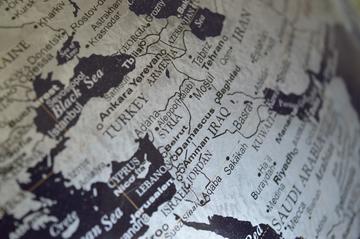We bring you and reflection piece from our Visiting Professor Hanna Notte, inspired by her course taught at UC Training Module at HSE, Moscow this February.

The deplorable state of relations between Russia and Western states has, in recent years, slowly but surely undermined prospects for their cooperation in the Middle East – a region in which joint endeavours still proved possible as late as 2014-2015, when tensions were already affecting other areas of cooperation. Indeed, in 2013-2014, Russia and the US led a multilateral mission in demilitarizing Syria’s declared chemical weapons arsenal and subsequently jointly worked towards signing the JCPOA with Iran and other actors in 2015. Yet, these issues, which provided arenas for cooperation not long ago, have become sources of heightened friction today. The Organisation for the Prohibition of Chemical Weapons (OPCW) is now internally divided over the post-2014 Russian-Western standoff over attribution and accountability for continued chemical weapons use in Syria, while the US’ unilateral decision to walk away from the JCPOA last year has served to further strain relations with Russia. Meanwhile, the Middle East remains the one geographic area in which, arguably, many Russian and Western interests overlap in theory, be it counterterrorism, stabilization, WMD disarmament or non-proliferation.
In order to better understand how prospects for Russia-West cooperation in the Middle East can be improved, it is vital to start by appreciating the prevailing differences in Russian versus Western perspectives on the most fundamental issues in the region: their divergent diagnoses of the root causes of instability in Middle Eastern societies in the context and wake of the Arab Spring; their divergent prescriptions for how to affect positive change in these societies, and their divergent understandings of the appropriate means and tools for achieving non-proliferation objectives (military means versus economic sanctions versus diplomacy) – because it is on these fundamental questions, rather than the end objectives, that opinions often differ most starkly among Russian and Western diplomats, officials, practitioners and even experts.
The short course on “Russia-West relations in MENA: analysing the viability of cooperation”, taught at the University Consortium module hosted by the Higher School of Economics in Moscow in February-March 2019, pursued precisely this objective, providing a platform for students to learn about, and discuss, Russian and Western countries’ principled positions and perspectives on Middle East cooperation along the lines outlined above. Consecutive lectures, which were followed by lengthy Q&A sessions and debate, focused on the different phases of the Syria war; security, economic and status drivers of Russian foreign policy in the Middle East; the Iran nuclear problematique; Libya; Yemen, and the Israeli-Palestinian conflict. Importantly, rather than dwelling on analysing the reasons for non-cooperation in recent years, the course put special emphasis on deciphering the drivers of successful cooperation in the rare instances in which it has materialised, dedicating a special session to the demilitarization of Syria’s declared chemical weapons in 2013-2014. The course aimed at sharpening a more nuanced understanding among the participating students from Russia and Western countries of the prevailing obstacles to cooperation between their countries in the Middle East today, and of enhancing empathy with other countries’ perspectives on conflict and sources of instability in that region.